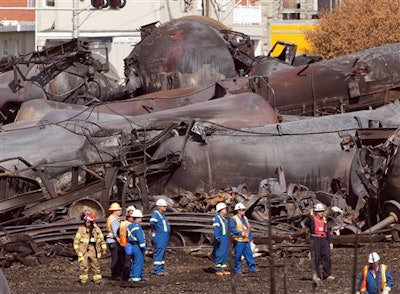
VANCOUVER, Wash. (AP) — Residents along the scenic Columbia River are hoping to persuade regulators to reject plans for what would be the Pacific Northwest's largest crude oil train terminal — the proposed destination for at least four trains a day, each more than a mile long.
The increasing numbers of trains, each carrying tens of thousands of barrels of potentially volatile crude from the Bakken oil fields in North Dakota, have raised concerns around the country after nine accidents in the past year, including one last month in Virginia.
In Vancouver, Washington, just across the Columbia from Portland, Oregon, the oil companies say their proposed terminal will create at least 80 permanent jobs and will bring an economic windfall to the region. But area residents and others in nearby communities are worried about the risks to people, wildlife, businesses and to their way of life.
"We depend on the Columbia for moving freight, generating power, irrigating farms, fishing," said Eric LaBrant, president of the Fruit Valley Neighborhood Association, which represents about 2,000 residents who live next to the proposed site.
"Anywhere on the Columbia, an oil spill would cripple our economy," he said.
The river is, in a way, the soul of the Pacific Northwest. It is cherished for its beauty, for its recreational offerings like wind surfing, and for the salmon and steelhead caught by sport fishermen, commercial fishermen and Native Americans.
The fight over the terminal underscores a new reality on the West Coast: The region is receiving unprecedented amounts of crude oil by rail shipments, mostly from the oil boom in North Dakota, Montana and parts of Canada.
More than a dozen oil-by-rail refining facilities and terminals have been built in California, Oregon and Washington in the past three years. As a result, long oil trains are already rolling through rural and urban areas alike — including along the iconic Columbia.
Another two dozen new projects or expansions are planned or in the works in those three states.
While traditionally most crude has moved to Gulf Coast and the East Coast terminals and refineries, experts say there's a West Coast boom because of cheap rail transport prices and its proximity to Asian markets should Congress lift a ban on U.S. oil exports.
Oil by rail shipments through Oregon ballooned from about 1.6 million barrels of crude carried on 2,789 tank cars in 2009 to more than 11 million barrels on 19,065 tank cars in 2013, according to annual railroad company reports.
In California, the volume of crude imported by rail skyrocketed from 45,500 barrels carried on 63 tank cars in 2009 to more than 6 million barrels on 8,608 tank cars in 2013, according to data by the California Energy Commission.
The state estimates its oil-by-rail shipments will rise to 150 million barrels per year in 2016.
And in Washington state, crude oil shipments went from zero barrels in 2011 to 17 million barrels in 2013, according to the Washington State Department of Ecology, though officials said those numbers are rough estimates.
The two main rail companies, Union Pacific and Burlington Northern Santa Fe, say they work hard to prevent accidents by inspecting tracks and bridges, investing in trailers with fire-fighting foam and providing hazmat training to emergency responders.
Still, the spike in shipments has led to concerns among officials in the Pacific Northwest over rail safety and oil spill responsiveness — and to opponents lashing out at rail companies for not disclosing how much oil is being shipped and where. Railroad companies aren't required to disclose such information.
In some cases, oil-by-rail transports on the West Coast started without the knowledge of local communities or emergency responders.
A terminal near Clatskanie, 62 miles northwest of Portland, was permitted to move oil two years ago by Oregon's Department of Environmental Quality without a public process. This year, the state fined the facility for moving six times more crude than allowed.
The disclosure caused public protests, but the company, Global Partners, says it's following the law.
In the San Francisco Bay area, where the local air district in February issued a permit to operate a crude-by-rail project in Richmond without notice to the public or an environmental review, residents and environmental groups filed a lawsuit.
They are seeking a preliminary injunction and a suspension of the air permit, pending a full environmental review.
"We feel that we were deliberately deceived by the permitting authority," said Andres Soto, the Richmond organizer for Communities for a Better Environment, an environmental justice group that's a plaintiff in the case.
"The delivery of this product right next to schools, to neighborhoods, where literally you can throw a rock and hit these rail cars, presents a clear danger to literally thousands of residents," Soto said.
The fears are shared by many in Vancouver, where officials received more than 33,000 public comments about the project — detailing feared impacts to air quality, wildlife, recreation, tribal treaty rights, and home values, among others.
After a review, state officials will make a recommendation to Gov. Jay Inslee, who has the final say.



















